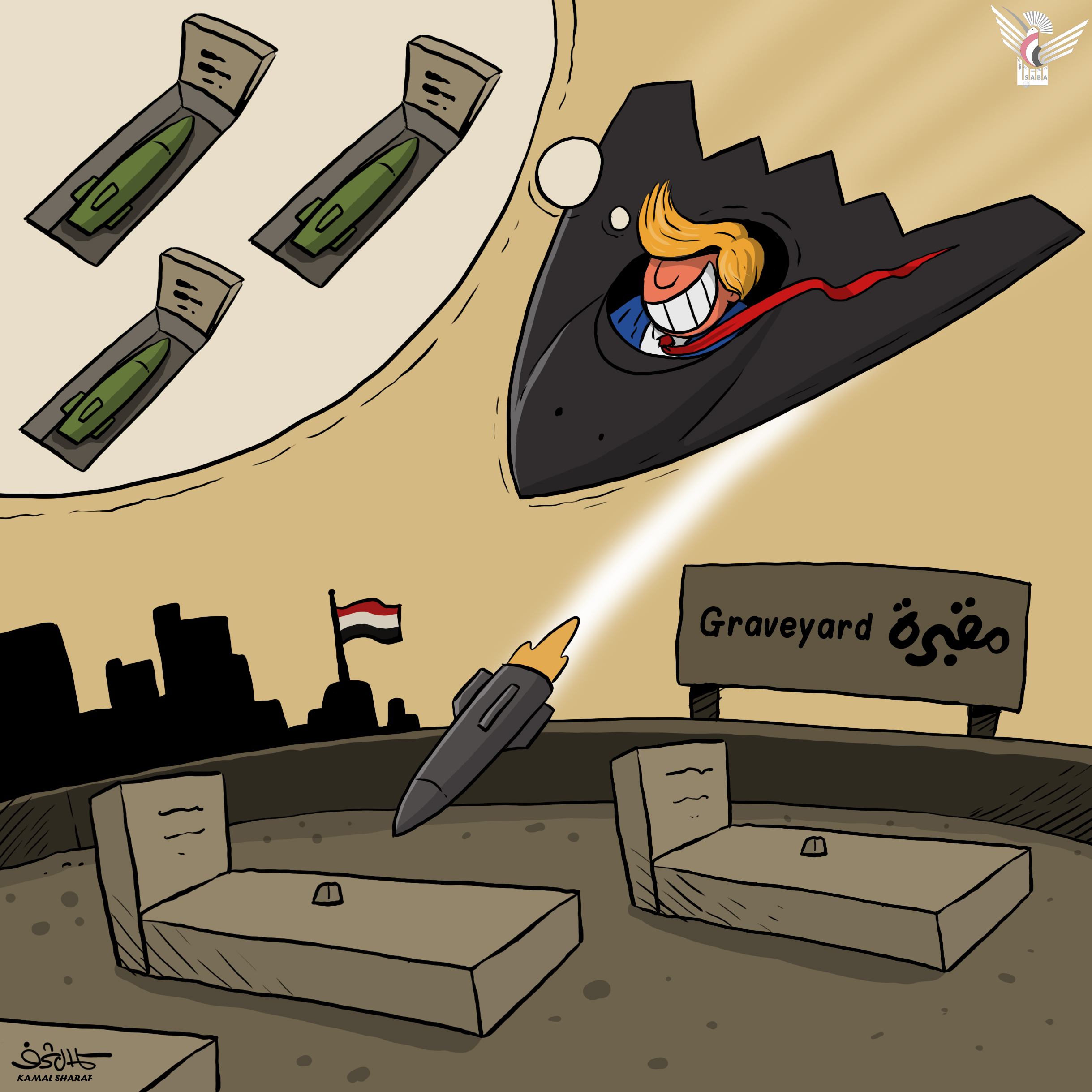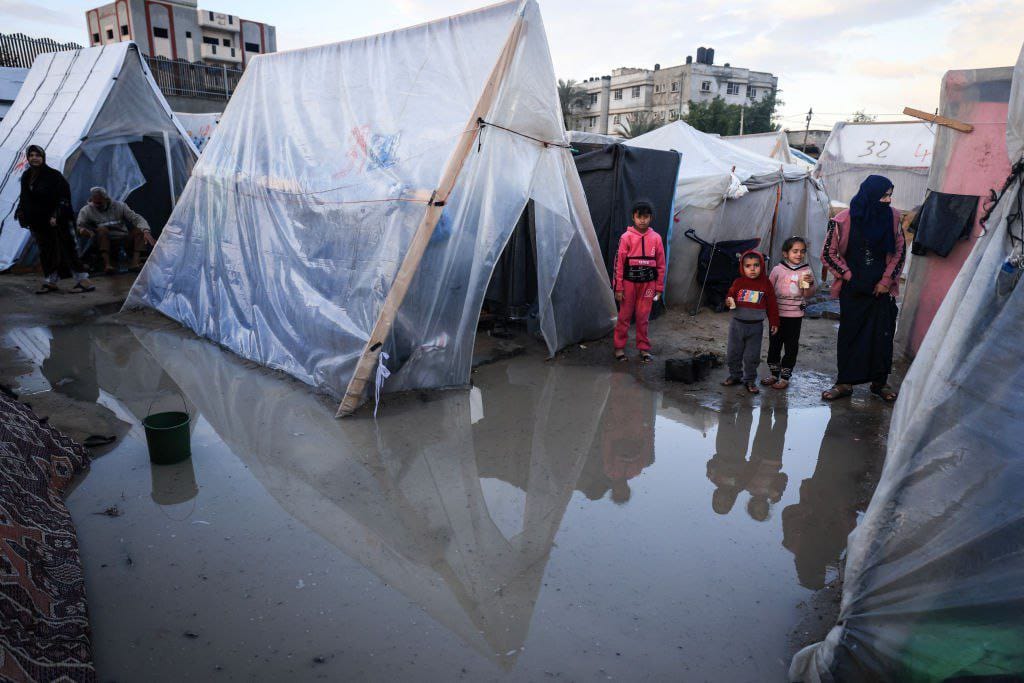Sana'a - Saba:
With each severe cold wave and ongoing Israeli bombardment, the suffering of displaced people in Gaza living in tents increases. They face not only the hardships of displacement, tent life, and shortages of water, food, and healthcare, but also the accumulation of waste in their displacement areas.
The United Nations Relief and Works Agency for Palestine Refugees (UNRWA) warned on Monday that nearly one million displaced Palestinians in Gaza face the risk of cold and rain this winter.
In a post on its "X" platform account, UNRWA stated that displaced people in Gaza need protection from rain and cold, noting that only about 23% of their needs have been met.
According to UNRWA, 945,000 Palestinians are at risk of cold this winter, emphasizing the urgent need to meet their needs as the crisis worsens.
UNRWA spokesperson Jonathan Fowler stated that about 60,000 Palestinians in northern Gaza live in catastrophic conditions under the ongoing Israeli siege for 62 days, "surrounded by death from all sides."
Fowler noted that delivering humanitarian aid to the area is "extremely difficult," with only 75 aid trucks entering through border crossings on November 27, despite the need for about 500 trucks daily to meet the population's needs.
He warned that the situation in northern Gaza has become "tragic" due to the lack of food, medicine, and potable water, as the residents of the sector "rely entirely on humanitarian aid to survive."
Since the start of the Israeli genocide in Gaza on October 7, 2023, the Israeli enemy has forcibly displaced nearly two million Palestinians from their homes to areas in Deir al-Balah and Mawasi Khan Younis, under the pretext of being humanitarian, but these areas were bombed by the enemy with arrogance and terrorism, in addition to depriving their residents of food and water.
Palestinian sources confirm that the Israeli enemy is adept at killing Palestinians, sometimes with bombs and missiles, starvation and siege, and now with health hazards.
Reports from government agencies in Gaza indicate that the enemy deliberately targeted infrastructure, sewage networks, and water lines, causing severe crises for the displaced, in addition to the crises they face every moment.
The scene is repeated with all displaced people throughout Gaza, with many, especially children, walking barefoot due to the lack of shoes and the wear and tear of most of them, resulting from the imposed siege and ongoing war on Gaza.
The Deputy Director General of the General Administration for Environmental Protection at the Environmental Quality Authority, Chairman of the Palestinian Environmental Friends Association, Engineer Atef Jaber, confirms that the accumulation of waste and wastewater in the streets poses the greatest danger to human health and the environment.
Jaber warned in a press statement that the ongoing Israeli war prevents municipalities from transporting waste to main dumpsites, resulting in worsening health hazards and the spread of diseases. He warned of the danger of random dumpsites, as they come into contact with humans and stray animals and deplete agricultural lands.
He pointed out that the mixing of this waste with hospital waste and its accumulation among the tents of the displaced warns of a health disaster, for which the Israeli enemy is responsible, as it prevents its transfer to main dumpsites, in addition to the millions of tons resulting from the destruction of homes and facilities.
According to the World Health Organization, which warned months ago of a comprehensive health and environmental disaster facing Gaza residents, contaminated water and deteriorating sewage systems are linked to the spread of diseases such as cholera, diarrhea, dysentery, and hepatitis.
Eyewitnesses report that thousands of infants in Gaza sleep daily complaining of cold and hunger, while adults are forced to sleep standing up, 430 days after the Israeli aggression that caused the greatest humanitarian disaster of the 21st century.
In late November, the United Nations Office for the Coordination of Humanitarian Affairs (OCHA) confirmed a severe shortage of suitable shelter for hundreds of thousands of displaced people due to hostilities across Gaza.
OCHA stated that less than a quarter of the shelter needs in the sector have been met, leaving nearly one million people at risk of exposure to harsh conditions as winter approaches.
It explained that about 545,000 people live in damaged buildings and temporary shelters, emphasizing the urgent need to ensure the entry of thousands of tarpaulin and insulation kits to repair living spaces into the sector without delay.
Gaza experienced a weather depression and heavy rains in late November, causing damage to about 10,000 tents housing displaced people, according to a statement by the government media office in Gaza.
The media office stated that the Israeli army prevented the entry of 250,000 tents and caravans (mobile homes) into the sector amid a severe humanitarian situation.
Northern Gaza areas experienced violent attacks, with Israeli army vehicles firing heavily towards western Jabalia camp areas, and many neighborhoods of the camp and other areas in the Beit Lahia project area were subjected to heavy artillery shelling.
Residents of northern Gaza confirmed that warplanes carried out a series of airstrikes on Beit Lahia, while Israeli soldiers burned residential homes around the Development Association in the town. In extensive sabotage and destruction operations, Israeli soldiers blew up new buildings in Jabalia camp, with the sounds of explosions heard from several areas in northern Gaza and neighboring Gaza City neighborhoods.
Meanwhile, Gaza City Municipality, the largest city in Gaza, fears a complete collapse of the infrastructure in the "Sheikh Radwan Pond" area, north of the city, where rainwater and sewage accumulate due to ongoing Israeli bombardment.
Official Palestinian reports confirm that Israeli forces deliberately destroyed more than 80% of the infrastructure in Gaza due to continuous bombardment.
The announcement by the World Central Kitchen charity organization to suspend its operations in Gaza exacerbated the famine crisis among displaced people in the southern sector, amid the closure of many food kitchens due to the lack of food supplies.
The World Central Kitchen charity organization announced on November 30 the suspension of its operations in Gaza after an Israeli airstrike hit a car carrying its employees, killing several of them, despite the organization's prior coordination with the Israeli enemy.
The Israeli enemy has continued its devastating aggression on Gaza by land, sea, and air since October 7, 2023, resulting in the martyrdom of more than 44,000 people, mostly women and children, and the injury of over 106,000 others, in an incomplete toll, as thousands of victims remain under the rubble and in the streets, unreachable by rescue teams.

| more of (Reports) |




